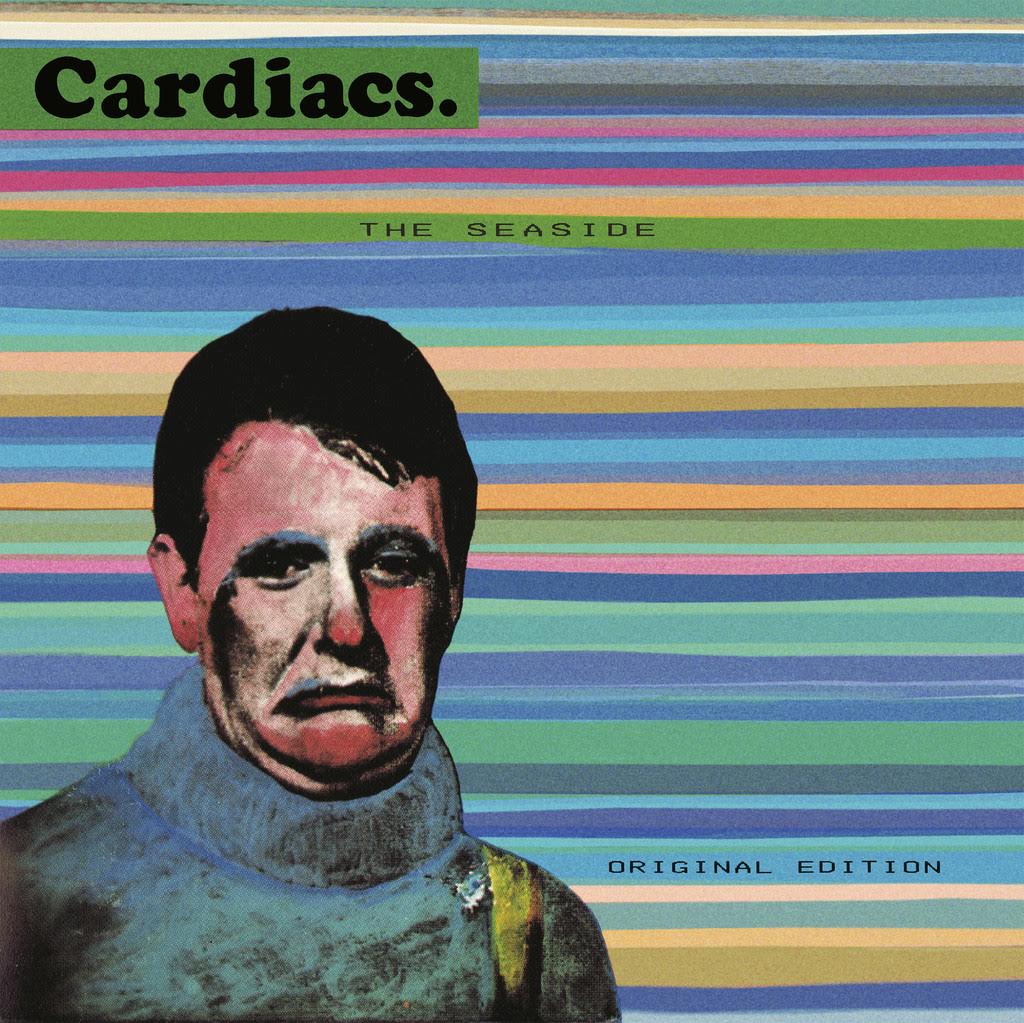Opinion is divided among Cardiacs fans as to which is the band’s best recorded work. Either 1989’s On Land And In The Sea or 1996s Sing To God, depending perhaps on the era of the individual’s initial fascination as well as their breadth of preferred musical palette. Tim Smith and company were formulating their musical vision even before the onset of the 80s, however, and The Seaside, now that it has finally been re-released in its original form, deserves to take its place alongside those two recordings as an early example of the kind of uniquely self-contained musical universe they were clearly already aspiring to making.
Available on CD, heavy double vinyl and as a box set containing all manner of unseen artwork and reproduced band memorabilia, the reissue reinstates the missing four tracks and returns the sound to a closer approximation of the original cassette, with a bit of additional punch to the bass and kick drum. Consequently, it sounds far better than the treble heavy 90s CD versions, which nevertheless doesn’t appear to cheer the crestfallen face of Jim Smith now returning to his rightful place on the front cover. Describing the band’s appearance at this time was always tricky at best but has recently become even more so due to John Doran’s recent Quietus Style Guide prohibiting many un-PC adjectives otherwise perfectly suited to the job. Suffice to say, that look (inspired in part by early Split Enz, David Lynch’s The Grandmother, Devo and The Residents), always made me feel uneasy and it still does now. Given the exceedingly dowdy yet horrifying nature of the band photos that accompany the CD release, I can only speculate as to what further monstrosities may be contained within the deluxe booklet that accompanies the box set.
Obviously the projection of this uncomfortable uncool was an important part of the band’s design; they looked as though they probably weren’t from around here and they sounded that way too. That many of their tunes were full of killer pop hooks fuelled by a kind of manic, uncontainable joy, both made sense and seemed to contradict their visual aesthetic. It was all part of the essential enigma that reeled me in to begin with, and as strange as they look, I can’t help but ponder how even more incongruous they would have appeared had they turned up onstage normally attired before launching into such off-the-wall music.
Although in some ways spiritually akin to The Red Crayola’s 1979 album Soldier Talk and early Devo, these recordings really don’t sound like anyone else. The spirit of Frank Zappa and the naïve pop of Slapp Happy and their more experimental relation Henry Cow, might inform and inspire what transpires here, but not in an obvious way. The uniqueness goes way beyond the look, partly due no doubt to the addition of marimba, clarinet, sax and trumpet to that shiny, brittle synth sound and scrabbly guitar, but is also encoded into the structure of the songs’ DNA. ‘Jibber And Twitch’ is a good description of the feeling seeing Cardiacs live used to provide – that you could let all those little tics and and restrained urges that you had been controlling for the sake of polite society erupt out of the box in much the same way the characters in Lars von Trier’s The Idiots sought to transcend decorum by acts of spontaneous non-rational behaviour. The track itself, wound by some obscure internal clockwork, lurches around like a wounded pantomime horse yet still commands the power to send the listener whirling off into dervish-like delirium.
‘Gina Lolla Brigida’ is one of Cardiacs’ most sublime and effortlessly happy moments, like being spun around and around and never ever wanting it to stop, whilst perpetually wound marionettes spin wildly in the wings. ‘A Wooden Fish On Wheels’ and the best of the restored tracks, ‘Dinner Time’ with its opening section sung by Mark Cawthra, deploy the kind of rhythmical skank not heard in Cardiacs’ sound for decades and lovely music-box melodies delineated in marimba and keyboards. ‘Nurses Whispering Verses’, its title lifted from a lyrical line in the wonderfully melancholy Slapp Happy/Henry Cow song ‘In The Sickbay’ ("Nurses, whispering verses/Click shut their purses and depart"), for many years a live favourite, snakes along with its irresistibly catchy yet warped guitar riff. ‘Hope Day’ starts off all stop/start rhythms and fairground vibes but transforms by its end into undeniably epic territory. ‘R.E.S’ is like Zappa at his most complex, all traces of American identity removed and rendered in the good old fashioned English eccentric style. Closing track ‘To Go Off And Things’ is a perfect example of the band at their most wired and freaked out, featuring surely one of the best noise breakdowns of all time following the command: ‘Take It Sarah!’ More gleefully discordant and chaotically exuberant than even Devo’s ‘Jocko Homo,’ it serves as a succinct statement encapsulating everything that made the band truly unique at that time and still sounds as singular today.
<div class="fb-comments" data-href="http://thequietus.com/articles/19149-cardiacs-the-seaside-review” data-width="550">


